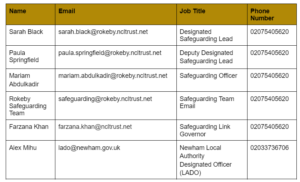Safeguarding and Online Safety
What safeguarding means at Rokeby
Safeguarding is the action that is taken to promote the welfare of children and protect them from harm. Safeguarding means:
- protecting children from abuse and maltreatment;
- preventing harm to children’s mental and physical health and development;
- ensuring children grow up with the provision of safe and effective care; and
- taking action to enable all children and young people to have the best outcome.
Child protection is part of the safeguarding process. It focuses on protecting individual children identified as suffering or likely to suffer significant harm. This includes child protection procedures which detail how to respond to concerns about a child.
At Rokeby School, we believe the well-being and safety of all students is the responsibility of all members of staff and we are committed to safeguarding students and to creating a culture of vigilance in the school.
As part of Newham Community Learning, at Rokeby School we follow the protocols and procedures outlined in the Trust wide Safeguarding and Child Protection Policy, available on the Policies Page of our Trust website. The policy includes named contacts at all six schools within the Trust, and has been updated in line with the release of the September 2025 DfE’s Keeping Children Safe in Education document available on this page of gov.uk, effective from 01 September 2025.
The Trust Board of Newham Community Learning has a Lead Safeguarding trustee, details of which can be found on the Structures and Oversight Page of the Trust website. Our local governing body at school also has a designated governor who leads safeguarding – Julianne Marriott, who is also our Chair of Governors.
Our safeguarding practices are further supported by our Safer Recruitment Policy, which details how all staff and volunteers are brought on board, including all the checks that are undertaken. This is also available for review on the Policies Page of the Trust website.
All staff at Rokeby School receive annual Safeguarding Training. In addition, specific training, such as Female Genital Mutilation (FGM) Training and Prevent Duty Training is also provided throughout the year.
Contact details for our Safeguarding Team

Roles and responsibilities
All staff are responsible for:
- creating a safe and nurturing environment within the school
- wearing their staff ID at all times
- following school procedure when inviting visitors to the school
- being vigilant at all times, contributing to a whole school culture of vigilance
- being aware and noticing the signs of abuse, neglect or any other form maltreatment in students
- role modelling the highest standards of positive language and conduct
- challenging sexist, racist, homophobic and any other discriminatory language
- reporting any concerns, on ‘Safeguard’, or to a member of the safeguarding team
Students are expected to:
- follow the Rokeby code of conduct, at all times
- follow the ‘No Hands’ rule
- follow instructions the first time
- speak politely, clearly and respectfully
- report any unsafe or concerning situations
- speak to a member of staff if they feel unsafe or worried
All parents are responsible for:
- ensuring their child’s emotional, mental and physical well-being and safety
- ensuring their child arrives on time and attend school regularly
- informing the school when their child is expected to be absent
- informing the school of any personal circumstances that might have an impact on their child’s well-being and/or safety
- supporting the school’s behaviour policy, ethos and values
Online Safety
At Rokeby School, we believe it is important for parents and carers to have regular conversations at home regarding staying safe online to support our work in this area at school. As part of this dialogue, parents and carers are able to encourage children to speak to them if they come across disturbing online content.
Below are a range of resources which provide guidance for parents and carers to keep children safe online. They will, amongst other things, support parents and carers to talk to their children about a range of online safety issues, set up home filtering in a child-friendly way, and set up age-appropriate parental controls on digital devices.
- Thinkuknow by National Crime Agency-CEOP (Child Exploitation and Online Protection) provides resources for parents and carers and children of all ages to help keep children safe online
- Childnet has developed guidance for parents and carers to begin a conversation about online safety, as well as guidance on keeping under-fives safe online
- Parent Info is a collaboration between Parent Zone and NCA-CEOP, providing support and guidance for parents and carers related to the digital world from leading experts and organisations
- NSPCC has guidance for parents and carers to help keep children safe online
- UK Safer Internet Centre provides tips and advice for parents and carers to keep children safe online – you can also report any harmful content found online through the UK Safer Internet Centre
The links below provide further information for parents and carers about managing online activity at home.
